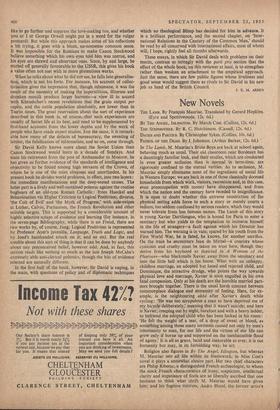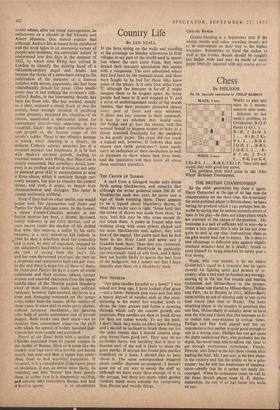New Novels
THE LAMB. By Francois Mauriac. Translated by Gerard Hopkins. (Eyre and Spottiswoode, 12s. 6d.) IN The Lamb, M. Mauriac's Bruin Boys are back at school again, behaving much as usual. Their old classroom near Bordeaux has a dauntingly familiar look, and their studies, which are conducted in even greater seclusion than is normal in term-time, are rigorously confined to the eternal verities. As to seclusion, M. Mauriac simply eliminates most of the ingredients of social life in Western Europe; we are back in one of those classically doomed households from which work, visitors, recreation and, in this case, even preoccupation with money have disappeared, and from which the nation and the century have receded to insignificance. It is open to doubt whether this extreme constriction of the physical setting adds force to such a story or merely courts a tedium, too seldom confessed by serious readers, which they would never tolerate from less famous names. The Lamb of this story is young Xavier Dartilongue, who is bound for Paris to enter a seminary but who yields to the temptation to immerse himself in the life of strangers—a fault against which his Director has warned him. The warning is in vain; spared by his youth from the First World War, he is fated, he knows, for another sacrifice. On the train he encounters Jean de Mirbel—a creature whose cynicism and cruelty must be taken on trust here, though they derive from his boyhood as depicted in A Woman of the Pharisees—who blackmails Xavier away from the seminary and into the little hell which is his home. What with an unhappy, childless marriage, an adopted but hated and rejected child, and Dominique, the attractive drudge, who points the way towards physical love and marriage, Xavier is soon engulfed in his own fatal compassion. Only at his death are the horrible married part- ners brought together. There is the usual harsh contrast between commonplace dialogue and extremity of feeling. Here, for ex- ample, is the neighbouring abbe after Xavier's death while cycling : `He was too scrupulous a man to have deprived me of my bicycle deliberately,' meaning that it wasn't suicide; and here is Xavier, creeping out by night, barefoot and with a heavy ladder, to befriend the adopted child who has been locked in his room : 'He felt the weight of a tear, of a drop of sweat or blood, as something among those many torments caused not only by man's inhumanity to man, for our life and the virtues of our life can grow only if borne up and supported on the inexhaustible flood of agony.' It is all as grave, lucid and inexorable as ever; it is not humanity but may, in its forbidding way, be art.
Religion also figures in By The Angel, Islington, but whereas M. Mauriac sets all life within its framework, in Miss Cost's novel it plays a somewhat elusive part. Her two chief characters are Philip Riberac, a distinguished French archwologist, to whom the stock French characteristics of irony, scepticism, intellectual clarity and impatience of fools are so liberally ascribed that one hesitates to think what shrift M. Mauriac would have given him; and his fugitive mistress, Andra Hood, the former artist's model whom, after ten years' estrangement, he rediscovers as a cleaner in the Victoria and Albert Museum. One should explain that although Andra's life is traced from childhood and the book takes in an enormous variety of people and incidents, the ostensible 'action' is compressed into five days in the summer of 1935, by which time Philip has arrived in London to identify the missing hand of a thirteenth-century angel and Andra has become the victim of a news-hunt owing to the publication of the memoirs of a famous sculptor with whom, apparently, she had been telepathically linked for years. (This intelli- gence may at last indicate the reviewer's diffi- culties.) Andra, in the intervening decade, has been far from idle. She has worked, mostly as a char, retained a smart frock or two for parties, been wrongly accused of receiving stolen property, procured the abortion of an actress, manifested a spectacular talent for intercessory prayer—very surprising in this beautiful, kindly but rather colourless girl— and groped on the bottom rungs of the mystic's ladder. There is one effective passage in which, while charring in a library, an eminent Catholic scholar surprises her at a mystical manual and intervenes. It is in fact with Andra's spiritual growth, leading to eventual reunion with Philip, that Miss Cost is mainly concerned. Her subsidiary detail, how- ever, is so profuse and so devious as not only to demand great skill in manipulation to save it from chaos, which it certainly though nar- rowly escapes, but also to obscure the central theme, and even, it seems, to impair both characterisation and dialogue. The latter is almost uniformly artificial.
Even if they had no other merits, one would praise both The Stepmother and Dates and Parties for their dialogue alone. In the former, a clever French-Canadian spinster in her forties marries her boss, a decent, harassed, lonely widower in the Civil Service, and at once moves under the shadow of his deified first Wife. Her stepson, a major by his early twenties, is a very mixed-up kid indeed; in • 1944 he shot a subaltern dead for cowardice and is now, by way of expiation, engaged to the subaltern's hard-bitten widow. Faced with the task of saving both the boy's life and her own threatened marriage, she puts up a desperate and resourceful fight and just wins. In the end there is hope for all three of them. In Dates and Parties we have a crew of crank politicians and their cronies, queers, society women and assorted characters from the upper middle class of the Munich period thrashing away at their intrigues, fears, and political rancours; however light-hearted, the book is a keen and damaging comment on the symp- toms, rather than the causes, of the malaise of those years. It takes skill to make party chatter, without laboured elucidation, the genuine echo both of public convulsion and of private despair. Both books owe their merit—not to mention their amusement value—to the skill with which the speech of widely assorted indi- viduals has been caught and sustained.
Patrol of the Dead deals with a section of Chindits separated from its parent column in the depths of Burma. Most of it reads like the crudely-told true story of a terrible and heroic march, but now and then it lapses into some- thing close to had war-time journalism. If invented, it is a considerable if inelegant piece of invention; if not, as seems more likely, its rounding out into 'fiction' has been poorly done. In either case it is desperately exciting, and anyone who remembers Burma will find

































 Previous page
Previous page